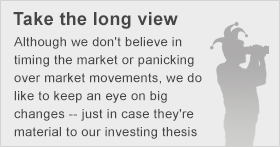
The Dow Jones Industrial Average (^DJI +0.63%) was trading 14 points in the green, or 0.08%, by midafternoon. Though still on pace for a weekly loss, the Dow remains near its all-time high reached just last week. Investors also hope that Wells Fargo, which beat expectations on revenue in its second-quarter report but failed to increase earnings per share from the preceding quarter, isn't a sign of other corporate earnings coming in lower than anticipated.
If earnings season is chalk full of slight earnings misses, investors would be wise to go bargain shopping on sell-offs, as long as a company's core business and long-term strategy remain viable and intact.
With that in mind, here are some major industrial companies making headlines today.
In the automotive industry, Tesla Motors (TSLA +4.08%) received some good news out of China this week. In an effort to generate additional demand for electric vehicles, which have posted sales far below the government's goal, China will waive a 10% purchase tax on electric vehicles from the beginning of this September through the end of 2017.

Source: Tesla Motors.
In addition to electric vehicles that are produced in China, the tax break also applies to imported electric vehicles. Tesla has repeatedly stated that China will soon be a critical market for the young automaker. Tesla CEO Elon Musk has gone as far to say that Tesla sales in China could equal those in the United States as soon as 2015.
The cause for Tesla's potential in China, aside from the fact that the overall automotive market is exploding, is that sales of luxury and electric vehicles are expected to surpass their numbers in the United States within the next four to five years. That represents a substantial opportunity for a vehicle such as Tesla's Model S, which is a unique mix between a sports, luxury, and electric vehicle.
Inside the Dow, Boeing (BA +0.54%) would be one of the biggest losers if the Export-Import Bank, whose future will be determined by Congress later in 2014, meets an early demise. The Ex-Im Bank helps foreign buyers receive cheaper financing to buy from U.S. companies such as Boeing; it's essentially a way to offset certain subsidies those foreign buyers might have received from their own government as incentive to purchase domestically.
"Anything we can do to help American businesses capitalize on opportunities that exist in overseas markets is something we want to make sure that we're taking advantage of," White House spokesman Josh Earnest said, according to USA Today.
While the Ex-Im Bank has certainly received its fair share of criticism, even being dubbed the Bank of Boeing, its role in the airplane maker's business can't be denied. The Ex-Im Bank helped support 789 Boeing aircraft deliveries between 2008 and 2013, according to USA Today. Furthermore, the Ex-Im Bank isn't the only bank playing this game, as European counterparts have supported Boeing's rival Airbus in a similar fashion.
In addition to Boeing shareholders, investors in other major industrial companies with a global sales footprint, such as General Electric and Caterpillar, should keep an eye on the Ex-Im Bank's fate late in 2014.







